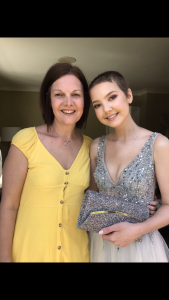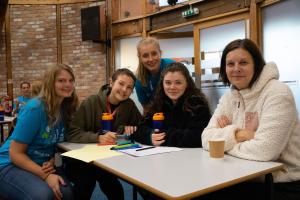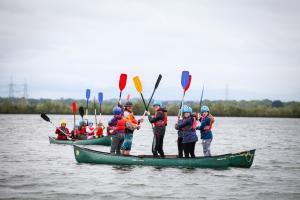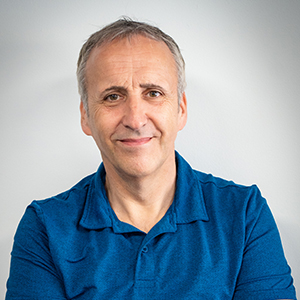Making memories
Susan Booker, 53, and her daughter Libbie from West Yorkshire visited an Over The Wall Family Camp after Libbie received a bone marrow transplant as part of her treatment for leukaemia. She explains how the charity’s camp gave them hope and helped them to build a support mechanism during a challenging time
Now aged 17, Libbie was diagnosed with leukaemia when she was 13 years old. She has spent the last few years in and out of hospital receiving treatment. “We first realised Libbie was unwell in January 2017 when she had a really bad ear infection that left her in complete agony,” remembers Susan. “We went to our GP and then the A&E at our local hospital, but each time our concerns were dismissed.”
After repeated unsuccessful trips to the doctor over several days, Libbie was eventually given some tests at the family’s local hospital, which showed she had abscesses in her brain. “She was rushed to another hospital for a CT scan of her head, then the next morning we found out she had leukaemia. “I am a cancer nurse and had always brought my children up to know that cancer just means abnormal cells and lots of people are cured of it, but I didn’t imagine I would ever be have to deliver that diagnosis to my own daughter, and our lives completely changed from there.”
Libbie was transferred to Leeds Hospital. “We were told she would need six months of intensive chemotherapy and would lose her hair. She had beautiful long blonde hair that she loved, so she just sat and cried when they told her that.” After finishing
a gruelling six months of treatment, Libbie was put on maintenance chemotherapy in summer 2017. However, the following summer – after starting to feel unwell with headaches and vomiting – the family learned she had relapsed. “We were told the leukaemia had spread to Libbie’s brain fluid as well as her bone marrow, which was absolutely devastating. Libbie was also heartbroken she was going to lose her hair again just when it had started to grow back.
“She was started on more intensive chemotherapy straight away, which made her very unwell. She had to have a gastrostomy tube put in and didn’t eat for a month, as she was sick all the time, and had to have an ovary removed to preserve her fertility before starting radiotherapy to her brain and entire body. She developed swine flu in hospital and also collapsed one day due to sepsis from her Hickman line, so it was really touch and go for a while.”
On 21 December 2018, Libbie received a bone marrow transplant. “She had to remain in isolation for months following the transplant, so we spent a really strange Christmas in hospital with her feeling so unwell. I remember us trying to open presents and she had to keep stopping to be sick. Even though I’ve been a nurse for 30 years, I’ve never known anything like it. It was such a horrific time and a place in our lives I hope never to revisit.”
In March 2019, Libbie returned home. “She was still really, really ill and had to come home with a syringe driver and have constant anti-sickness medication going through that. She still had a gastrostomy tube and her white blood cell counts were really low, so everything had to be bleached and she wasn’t allowed to go out or do anything.
“It was GCSE year and, despite not having been at school for years, Libbie was determined not to repeat a year at school, so she focused on revising and completing four of her GCSEs. The school offered to get an examiner to come to the house but Libbie wanted to go to school like everyone else, so they got her a room on her own with just an examiner in, and she completed her exams with a sick bowl next to her.”
In July 2019, a checkup revealed Libbie’s bone marrow was growing back. “This shouldn’t happen post- transplant, so more donor cells were given every six weeks from July 2019 to February 2020 in a treatment called donor lymphocyte infusion, which eventually started working.”
During this time, in September 2019, Libbie, Susan and Mae – the girlfriend of Susan’s oldest son, who had spent a lot of time keeping Libbie company in hospital – attended an Over The Wall Anthony Nolan Family Camp for people who had had bone marrow transplants. Libbie and her family were allocated two volunteers – one who worked for Anthony Nolan and a medical student – who looked after them for the weekend.
“We were treated like royalty from the moment we got there, and the volunteers became like good friends. The whole weekend was just so much fun and we laughed the entire time. We did laser quest and outdoor activities such as abseiling. I remember when we arrived on the first night seeing everyone doing the Waka Waka dance and we thought, ‘We’re not doing that’. By the last night we couldn’t stop dancing – and we still do the Waka Waka at home! The food was also great and it was good to see Libbie eat again.”
One of the best things about the trip for Susan was being introduced to other parents. “It was really helpful to meet other people with similar experiences. Hearing stories of other children who had gone through this and gone on to survive and be healthy was the most amazing thing and gave me hope.”
For Susan and Libbie, their weekend away is something they will remember forever. “I am still in touch with other parents who are a great support. Libbie and I talk about the camp all the time. We absolutely loved attending and it is an experience we really treasure. It gave us an opportunity to smile again and some fun when we needed it most.”
Over The Wall, tackling isolation in seriously ill children
Fundraising target: £40,000
Over The Wall is using the money raised in the Candis Big Give to tackle isolation in seriously ill children through therapeutic recreation camps in 2021. The money will provide 200 children who are living with conditions that affect their quality of life –
leading them to miss out on many normal activities and causing them to have long periods of time in hospital or at home leaving them isolated from their peers – with an opportunity to escape from the confines of illness and discover abilities and friends in the nurturing and supportive environment of a physical and/or virtual camp.
In light of the Covid-19 pandemic – which has increased isolation in seriously ill children – if the charity is unable to run its physical camps, it will use the money to provide additional virtual camps with places for even more children. This Camp in the Cloud programme replicates many parts of the physical camps that children get the most out of, such as the ability to interact with others, meaning campers and families can experience the magic of an Over The Wall camp from the comfort and safety of their own home. It also means the camp experience is made available to every child – including those unable to come to a residential camp because they are in hospital or bedbound, and those currently on the waiting list to attend a camp. Every child attending an online camp will be sent an activity box with all of the items that are needed for the weekend’s activities – including face paints and cocoa for cabin chats at night – and children will be given the opportunity to join in with crafts, dancing and other fun activities with their peers. Visit otw.org.uk to find out more.
What Over The Wall means to me
“I had recently retired from my job and was looking for some volunteer work when I first heard of Over The Wall. I signed up to volunteer for one of their recreational camps in Perthshire, and the experience just blew me away.
I remember picking up camp attendees on a minibus from a children’s hospital in Edinburgh and meeting a young girl with cancer, who was looking really worried and nervous and hanging on to her mum. Her parents told me how anxious they were feeling about her going away, so I promised we would call every night.
A few nights later, towards the end of the camp, her parents decided to come up for a visit. The place was wild with everyone dressed up, singing songs and having a great time, and I pointed out the table their daughter was on. They looked over and burst out crying, which had me in tears too. Their little girl – who they had watched for three years battle cancer, not seeing her friends, not seeing her enjoy herself – was there with her wig off, all dressed up, dancing away with her new-found friends. It was such an emotional moment and I think the epitome of what these camps are all about.
For me, seeing that sort of transformation happen to 50 or 60 children every camp is just incredible and what made me say yes immediately when I was asked to come and work for the charity as CEO a decade ago. I am in such a privileged position helping to make sure this amazing charity is running smoothly and getting to witness all the benefits of that. I still visit the camps when I can and see the children, who have missed out on so much, having such a joyful time. I also get letters from parents after every camp thanking us for giving them their son or daughter back, who they thought they had lost to the illness. The charities inject some of the fun, social interaction and opportunities to try new things into the lives of children who would otherwise miss out, giving them back a vital part of their childhood and a renewed zest for life.”





Leave a Reply
Please login or register to leave a comment.